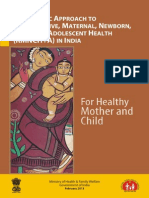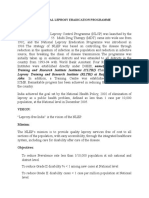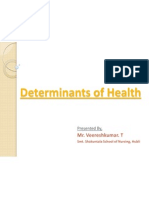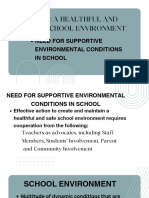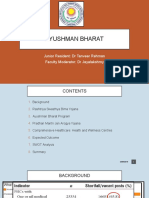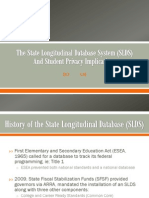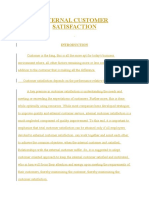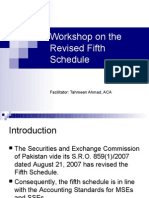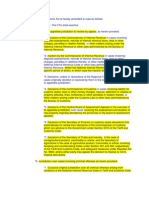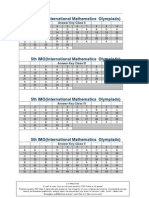School Health Record
School Health Record
Uploaded by
Sankita SandalCopyright:
Available Formats
School Health Record
School Health Record
Uploaded by
Sankita SandalOriginal Title
Copyright
Available Formats
Share this document
Did you find this document useful?
Is this content inappropriate?
Copyright:
Available Formats
School Health Record
School Health Record
Uploaded by
Sankita SandalCopyright:
Available Formats
PACER Center’s HEALTH INFORMATION CENTER (HIC)
a project of PACER Center
School Health Records: Privacy and access
Under both Minnesota and federal law, school health records are considered educational records. This means that
your and your child’s rights to privacy and access are governed by the same laws that apply to educational records.
What are school health records?
Schools are required to keep certain health-related records about all students, including immunization
information, growth, vision testing and hearing screening findings, attendance data, preschool health screening,
and TB screening information.
In addition, many schools provide medical services to individual students. These medical services generate
health records. The medical services may or may not be part of an Individualized Education Program (IEP), and
may be provided by the school nurse or other health care provider.
It is important to note that any health records that the school receives from outside providers will most likely
be considered school health records. This means they may be reviewed by teachers and other school officials
who have a legitimate educational interest in the information. It is also possible that teachers and officials from
schools where your child seeks, to or intends to enroll, may also have access to the information.
School health records are educational records
Since school health records are considered educational records, they are subject to the Minnesota Government
Data Practices Act and the federal Family Educational Rights and Privacy Act (FERPA).1 This means that
schools are subject to different health record privacy and access requirements than doctors, clinics, or hospitals
are. (See PACER handouts on “Access to Your Child’s Health Records” and “Release of Your Child’s Health
Records” for information on these requirements.) Under FERPA, the records are “private” which means that
the information is accessible to you and certain school officials but not to the public. It also means that you have
the right to know what kind of information the school maintains about your child and you have the right to
contest the accuracy of the information. If the school is unwilling to correct the contested record, you have the
right to place written comments in the record.
Right to access
You and your child have the right to see the health records kept by the school. If you request copies of the
records, the school must provide them to you. The school may require you to pay the actual costs of making,
certifying, and compiling the copies unless that fee prevents you from having access to the records. The school
must give you access to the records immediately, if possible, or within ten days of the date of the request if
immediate compliance is not possible. If the records are maintained in computer storage, they must be provided
to you in electronic form, however, there is no requirement that the information be provided in a different
program than that which is maintained by the school. There is no limit to the number of times a parent of a
child with a disability can request to inspect their child’s records.
1
Under the Minnesota Government Data Practices Act, the parent and student (who is a minor and not attending a postsecondary program)
share the rights of access to and privacy of educational records. FERPA gives rights only to the parent.
© 2017, 2001 PACER Center, Inc., 8161 Normandale Boulevard, Minneapolis, Minnesota 55437-1044 • HIAC-h18
(952) 838-9000 • Toll-free in Greater Minnesota: (800) 537-2237 • PACER@PACER.org • PACER.org
This handout was developed in part under a grant from the Health Resources and Services Administration (HRSA), U.S. Dept. of Health and Human Services (HHS)
grant #84MC00005 Family-to-Family Health Information Center, $95,700; and approximately 5% was financed with non-governmental resources. The contents
should not be construed as the official position or policy of, nor should any endorsements be inferred by, HRSA, HHS, or the Federal Government. This handout
is a summary of Minnesota Statute section 13.32. It is provided for informational purposes only and is not intended to constitute legal advice.
You might also like
- A Proposal To The Construction of A Two-Storey Family HouseDocument12 pagesA Proposal To The Construction of A Two-Storey Family HouseYrol-Angel Peralta100% (2)
- Quality Assurance in Community Health Nursing: December 2019Document5 pagesQuality Assurance in Community Health Nursing: December 2019jbd365No ratings yet
- Health, Its Concepts Determinants AND MeasurementsDocument40 pagesHealth, Its Concepts Determinants AND MeasurementsMamta RajputNo ratings yet
- GLOBAL HEALTH TRENDS JUNE 13th 2024 2NDDocument30 pagesGLOBAL HEALTH TRENDS JUNE 13th 2024 2NDdoctoramitgupta100No ratings yet
- A Strategic Approach To Reproductive, Maternal, Newborn, Child and Adolescent Health (RMNCH+A) in IndiaDocument81 pagesA Strategic Approach To Reproductive, Maternal, Newborn, Child and Adolescent Health (RMNCH+A) in IndiaJennifer Pearson-Paredes100% (3)
- Health Care DeliveryDocument51 pagesHealth Care DeliveryUmesh KawalkarNo ratings yet
- Workplace Violence Definition:: 4 TypesDocument2 pagesWorkplace Violence Definition:: 4 TypeskaranNo ratings yet
- Standard Safety Measures: DefinitionsDocument26 pagesStandard Safety Measures: DefinitionsAnilkumar JaraliNo ratings yet
- Seminar On Rehabiliatation 11 TH AugDocument51 pagesSeminar On Rehabiliatation 11 TH AugValathati Beena MadhuriNo ratings yet
- Materials Management in Primary Health Centre: A Process MappingDocument17 pagesMaterials Management in Primary Health Centre: A Process MappingAkansha JohnNo ratings yet
- Maternal Child Tracking Sysem PDFDocument9 pagesMaternal Child Tracking Sysem PDFMegha MalhiNo ratings yet
- 8B Panchayati Raj InstitutionDocument13 pages8B Panchayati Raj InstitutionAadhitya NarayananNo ratings yet
- School HealthDocument20 pagesSchool HealthJSeashark100% (1)
- Review OF Rmnch+A, RCH Including Other Maternal Health Programme and IdspDocument73 pagesReview OF Rmnch+A, RCH Including Other Maternal Health Programme and IdspGargi pandeyNo ratings yet
- National Family Health Survey-5Document5 pagesNational Family Health Survey-5Mayank SinghNo ratings yet
- Major Stakeholders in Healthcare SystemDocument7 pagesMajor Stakeholders in Healthcare SystemsurajNo ratings yet
- Seminar On Census, National Family Health Survey, Vital StatisticsDocument18 pagesSeminar On Census, National Family Health Survey, Vital StatisticsANITTA SNo ratings yet
- Health Care Deliver System AjayDocument41 pagesHealth Care Deliver System AjayAjay DNo ratings yet
- Ayushman Bharat YojanaDocument28 pagesAyushman Bharat YojanaParth VasaveNo ratings yet
- National Aids Control Programme Phase-Iv Current Status and Critical AppraisalDocument71 pagesNational Aids Control Programme Phase-Iv Current Status and Critical AppraisalNeethu Vincent100% (1)
- Ayushman Bharat Yojana: National Health Protection SchemeDocument28 pagesAyushman Bharat Yojana: National Health Protection SchemeKailash NagarNo ratings yet
- Apollo College of Nursing, Hyderabad-96: Community Health Nursing DepartmentDocument67 pagesApollo College of Nursing, Hyderabad-96: Community Health Nursing DepartmentJyothi K100% (1)
- National Programme For Prevention and Control of CancerDocument18 pagesNational Programme For Prevention and Control of CancerPrabhakaran AranganathanNo ratings yet
- Health Care Agencies & Their RolesDocument70 pagesHealth Care Agencies & Their RolesNeenu RajputNo ratings yet
- Janani Suraksha Yojana (JSY)Document23 pagesJanani Suraksha Yojana (JSY)vkb_99996326No ratings yet
- Revised National Tuberculosis Control ProgrammeDocument7 pagesRevised National Tuberculosis Control Programmescribd1No ratings yet
- Health Information SystemDocument13 pagesHealth Information SystemSimran WaghelaNo ratings yet
- It, Tele-Medicine & Tele-NursingDocument24 pagesIt, Tele-Medicine & Tele-NursingTRP GAMINGNo ratings yet
- National Leprosy Eradication ProgrammeDocument9 pagesNational Leprosy Eradication ProgrammeRekha ChaudharyNo ratings yet
- World Health AssemblyDocument1 pageWorld Health Assembly123nicky123No ratings yet
- National Population PolicyDocument23 pagesNational Population Policysaarika_saini1017No ratings yet
- IDD Control ProgrammeDocument13 pagesIDD Control ProgrammeathirabprasadNo ratings yet
- Determinants of Health by VeereshDocument12 pagesDeterminants of Health by VeereshVeeresh TopalakattiNo ratings yet
- A Research Paper On Pradhan Mantri Matru Vandana Yojana' (PMMVY)Document2 pagesA Research Paper On Pradhan Mantri Matru Vandana Yojana' (PMMVY)Editor IJTSRDNo ratings yet
- A Study To Assess The Quality of Life of Patients With Osteoarthritis in A Selected Hospital, Coimbatore, With A View To Develop An Informational BookletDocument5 pagesA Study To Assess The Quality of Life of Patients With Osteoarthritis in A Selected Hospital, Coimbatore, With A View To Develop An Informational BookletInternational Journal of Innovative Science and Research TechnologyNo ratings yet
- Family Welfare Programme PDFDocument28 pagesFamily Welfare Programme PDFshamanbrar14No ratings yet
- Substance AbuseDocument15 pagesSubstance AbuseDivij SaxenaNo ratings yet
- Global Burden of DiseasesDocument14 pagesGlobal Burden of DiseasessarahNo ratings yet
- The Global Burden of DiseaseDocument17 pagesThe Global Burden of Diseaseandreas5349No ratings yet
- Ayushman BharatDocument28 pagesAyushman Bharatahffjda0% (1)
- Health Administration at Union and State LevelDocument16 pagesHealth Administration at Union and State LevelUpendra SinghNo ratings yet
- Health Check Up Camps in SchoolsDocument10 pagesHealth Check Up Camps in SchoolsRichaNo ratings yet
- Urbanization Class - ViiDocument48 pagesUrbanization Class - ViiKavyaNo ratings yet
- Unit 2 A Healthful and Safety School EnvironmentDocument22 pagesUnit 2 A Healthful and Safety School EnvironmentAia BaxterNo ratings yet
- IPHS Fo SC PHC CHCDocument18 pagesIPHS Fo SC PHC CHCDrArun SinghNo ratings yet
- AYUSHMAN BHARAT Seminar SlidesDocument42 pagesAYUSHMAN BHARAT Seminar Slidesgilbert2691No ratings yet
- Standard of LivingDocument4 pagesStandard of Livingmy shadowNo ratings yet
- Small Family NormDocument21 pagesSmall Family NormKailash NagarNo ratings yet
- National Health Programmes: Dr. M.L. SiddarajuDocument40 pagesNational Health Programmes: Dr. M.L. SiddarajuGaoudam NatarajanNo ratings yet
- Universal Health CoverageDocument44 pagesUniversal Health CoverageSaurabh JainNo ratings yet
- Health SchemesDocument70 pagesHealth SchemesA J FathimaNo ratings yet
- Concepts of Health and IllnessDocument35 pagesConcepts of Health and IllnessDominic SantosNo ratings yet
- Health Insurance SchemeDocument10 pagesHealth Insurance SchemeKailash NagarNo ratings yet
- National Rural Health MissionDocument17 pagesNational Rural Health MissionShubham DwivediNo ratings yet
- Public Private Partnership: By: Ms. Priyanka Bansal Msc. Nursing-I Year Rufaida College of NursingDocument28 pagesPublic Private Partnership: By: Ms. Priyanka Bansal Msc. Nursing-I Year Rufaida College of NursingPriyanka BansalNo ratings yet
- Health Committee ReportsDocument25 pagesHealth Committee ReportsArun Jv0% (1)
- Chemo Administration PoliciesDocument64 pagesChemo Administration PoliciesgerajassoNo ratings yet
- Community Health A Complete Guide - 2020 EditionFrom EverandCommunity Health A Complete Guide - 2020 EditionRating: 5 out of 5 stars5/5 (1)
- Chronic Non-communicable Diseases in Ghana: Multidisciplinary PerspectivesFrom EverandChronic Non-communicable Diseases in Ghana: Multidisciplinary PerspectivesNo ratings yet
- Student Privacy and The SLDS Interim Study 10 10 2013Document51 pagesStudent Privacy and The SLDS Interim Study 10 10 2013Reclaim Oklahoma Parent EmpowermentNo ratings yet
- Clinical Experience Midterm Exam: Part 1: Confidentiality and Student RecordsDocument5 pagesClinical Experience Midterm Exam: Part 1: Confidentiality and Student Recordsapi-264950261No ratings yet
- Dermaology CareDocument2 pagesDermaology CareSankita SandalNo ratings yet
- Clinicomycological Study of Dermatophytosis in A.8Document5 pagesClinicomycological Study of Dermatophytosis in A.8Sankita SandalNo ratings yet
- Medip, IJCMPH-6361 ODocument6 pagesMedip, IJCMPH-6361 OSankita SandalNo ratings yet
- Tinea Corporis Updated ReviewDocument12 pagesTinea Corporis Updated ReviewSankita SandalNo ratings yet
- Prevalnce of Risk Factor TineaDocument5 pagesPrevalnce of Risk Factor TineaSankita SandalNo ratings yet
- Cost Consequences StudyDocument4 pagesCost Consequences StudySankita SandalNo ratings yet
- Screening ModelDocument8 pagesScreening ModelSankita SandalNo ratings yet
- Profile of Dermatological Disorders Among Workers.5Document7 pagesProfile of Dermatological Disorders Among Workers.5Sankita SandalNo ratings yet
- An Opd Based Prospective Exploratory Study of DermDocument4 pagesAn Opd Based Prospective Exploratory Study of DermSankita SandalNo ratings yet
- Taxation 2 Case DigestsDocument148 pagesTaxation 2 Case DigestsAncheden Ancheden100% (1)
- Promotional Message TemplatesDocument10 pagesPromotional Message TemplatesNilesh ShirishkarNo ratings yet
- EPIKO (Kontemporaryo Literaturang Filipino)Document44 pagesEPIKO (Kontemporaryo Literaturang Filipino)TcherKamila100% (1)
- 14 Points of DemingDocument6 pages14 Points of DemingRod Dumala GarciaNo ratings yet
- Internal Customer SatisfactionDocument24 pagesInternal Customer SatisfactiondinomohitNo ratings yet
- 795 1517 1 SMDocument13 pages795 1517 1 SMLennyAnggraini 81gmail.com LennyAnggrainiNo ratings yet
- RTA-12 New Piston Rod Gland Box For Undersized Piston RodsDocument5 pagesRTA-12 New Piston Rod Gland Box For Undersized Piston RodsCatalin CataNo ratings yet
- Fifth ScheduleDocument47 pagesFifth Schedulezulfi100% (1)
- Kevlar - Comprehension and GrammarDocument4 pagesKevlar - Comprehension and GrammarYM LimNo ratings yet
- Pil Aldabra PhadDocument14 pagesPil Aldabra PhadVEMATELNo ratings yet
- Engineering Considerations For Anodizing AluminumDocument1 pageEngineering Considerations For Anodizing AluminumTanzil ZaidiNo ratings yet
- Ttm-I4N Series User'S Manual: CautionDocument2 pagesTtm-I4N Series User'S Manual: CautionReza BP0% (1)
- Satellite Applications PDFDocument12 pagesSatellite Applications PDFchris hortonNo ratings yet
- Art&Craft PDFDocument10 pagesArt&Craft PDFReteshkumarvermaNo ratings yet
- Abhishek Kumar: Jindal Poly Films LTDDocument2 pagesAbhishek Kumar: Jindal Poly Films LTDAarav AroraNo ratings yet
- RA 9282 Amending RA 1125Document4 pagesRA 9282 Amending RA 1125edwardmlimNo ratings yet
- 379-Article Text-1473-1-10-20220217Document8 pages379-Article Text-1473-1-10-20220217Emiria SrikandiNo ratings yet
- Individual Assignment - ATF 10103Document2 pagesIndividual Assignment - ATF 10103a23a1732No ratings yet
- Convention Centre Architectural ThesisDocument8 pagesConvention Centre Architectural Thesisgjc8zhqs100% (2)
- Indzara Social-Media-Dashboard v1Document15 pagesIndzara Social-Media-Dashboard v1Yudith RachmadiahNo ratings yet
- Fluid Power Intensifiers Series PC, PD and PS: The Easier, Less Costly Way To Provide High Pressure Hydraulic PowerDocument8 pagesFluid Power Intensifiers Series PC, PD and PS: The Easier, Less Costly Way To Provide High Pressure Hydraulic PowerAmech SalesNo ratings yet
- Tecnical Specification - AC CABLE DATASHEETDocument7 pagesTecnical Specification - AC CABLE DATASHEETEisac SagimanNo ratings yet
- EHS Guidelines For Vegetable Oil Production and Processing - English (Feb 2015)Document24 pagesEHS Guidelines For Vegetable Oil Production and Processing - English (Feb 2015)IFC SustainabilityNo ratings yet
- Memo Report - Task A: StarbucksDocument4 pagesMemo Report - Task A: Starbucksapi-59321653No ratings yet
- KirloskarvalvespricelistDocument4 pagesKirloskarvalvespricelistsanjaymeenadjbNo ratings yet
- Particleboard Based On Rice Husk: Effect of Binder Content and Processing ConditionsDocument6 pagesParticleboard Based On Rice Husk: Effect of Binder Content and Processing ConditionsBren SisonNo ratings yet
- CH 101-Fall 22Document49 pagesCH 101-Fall 22Haider AliNo ratings yet
- Midterm RevisionDocument29 pagesMidterm RevisionNguyen Que TranNo ratings yet
- 5th IMO (International Mathematics Olympiads) : Answer Key Class IIDocument8 pages5th IMO (International Mathematics Olympiads) : Answer Key Class IIYashVanjaniNo ratings yet




